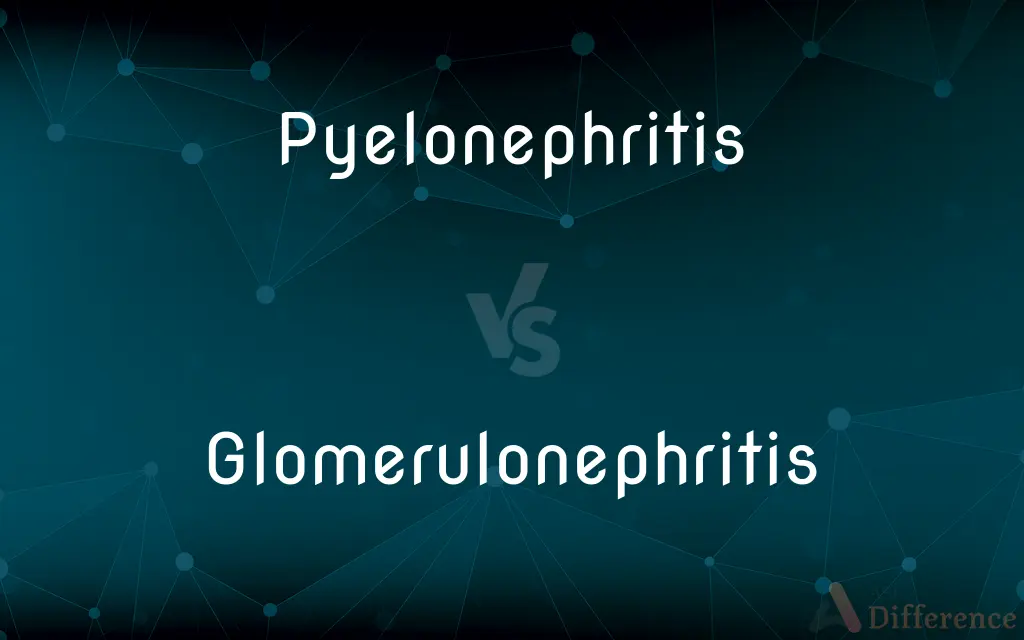Pyelonephritis vs. Glomerulonephritis — What's the Difference?
By Tayyaba Rehman — Updated on October 7, 2023
Pyelonephritis is an infection of the kidney, often caused by bacteria. Glomerulonephritis involves inflammation of the kidney's filtering units (glomeruli). Both affect kidney function but have different causes and manifestations.

Difference Between Pyelonephritis and Glomerulonephritis
Table of Contents
ADVERTISEMENT
Key Differences
Pyelonephritis and Glomerulonephritis are both medical conditions related to the kidneys, but they arise from different causes and have unique clinical implications. Pyelonephritis is primarily an infection of the kidney, often resulting from a bacterial invasion that has ascended from the lower urinary tract. It impacts the renal pelvis and the kidney's parenchyma. Common symptoms include fever, flank pain, and urinary symptoms. If not treated, it can progress and potentially cause severe complications.
On the other hand, Glomerulonephritis refers to the inflammation of the glomeruli, which are the tiny filtering units of the kidney. This condition isn't typically caused by an external infection. Instead, it arises from immune responses, systemic diseases like lupus, or after certain infections. Glomerulonephritis can present in acute or chronic forms. Its symptoms might include dark urine, swelling, and hypertension. Over time, it can lead to reduced kidney function and, in severe cases, kidney failure.
In essence, while both Pyelonephritis and Glomerulonephritis affect the kidneys, their origins differ considerably. Pyelonephritis is infectious in nature, often bacterial, whereas Glomerulonephritis is inflammatory, resulting from various internal triggers, including autoimmune reactions.
In clinical settings, differentiating between these conditions is crucial. While they might present with some overlapping symptoms like reduced kidney function or even hypertension, their treatments differ. Pyelonephritis often requires antibiotics, while Glomerulonephritis might necessitate immunosuppressive medications, among other interventions.
Comparison Chart
Definition
Infection of the kidney, often bacterial.
Inflammation of the kidney's filtering units (glomeruli).
ADVERTISEMENT
Cause
Often due to ascending bacterial infection.
Immune responses, systemic diseases, or post-infectious.
Affected Part
Renal pelvis and kidney's parenchyma.
Glomeruli of the kidney.
Primary Symptoms
Fever, flank pain, urinary symptoms.
Dark urine, swelling, hypertension.
Treatment
Antibiotics and supportive care.
Immunosuppressive medications, blood pressure control, etc.
Compare with Definitions
Pyelonephritis
Inflammation of the renal parenchyma and pelvis.
Pyelonephritis can lead to scarring if not treated promptly.
Glomerulonephritis
Inflammation of the kidney's glomeruli.
Glomerulonephritis can lead to significant kidney damage if not addressed.
Pyelonephritis
A bacterial infection of the kidney.
The patient was diagnosed with pyelonephritis after presenting with high fever and flank pain.
Glomerulonephritis
Can present in acute or chronic forms.
Acute glomerulonephritis manifested after the patient's throat infection.
Pyelonephritis
A condition that can be acute or chronic.
Acute pyelonephritis requires immediate medical intervention.
Glomerulonephritis
May result in reduced kidney function.
Due to glomerulonephritis, his kidney function decreased substantially.
Pyelonephritis
Often a result of an ascending urinary tract infection.
The UTI progressed, resulting in pyelonephritis.
Glomerulonephritis
A condition potentially triggered by immune responses.
Post-streptococcal infections can sometimes lead to glomerulonephritis.
Pyelonephritis
Potential complication of urinary tract obstructions.
The patient's untreated kidney stones led to pyelonephritis.
Glomerulonephritis
Associated with conditions like lupus.
Her lupus diagnosis increased her risk for glomerulonephritis.
Pyelonephritis
Pyelonephritis is inflammation of the kidney, typically due to a bacterial infection. Symptoms most often include fever and flank tenderness.
Glomerulonephritis
Glomerulonephritis (GN) is a term used to refer to several kidney diseases (usually affecting both kidneys). Many of the diseases are characterised by inflammation either of the glomeruli or of the small blood vessels in the kidneys, hence the name, but not all diseases necessarily have an inflammatory component.
Pyelonephritis
Inflammation of the kidney and its pelvis, caused by bacterial infection.
Glomerulonephritis
A form of nephritis characterized by inflammation of the renal glomeruli.
Pyelonephritis
(pathology) An ascending urinary tract infection of the renal pelvis
Glomerulonephritis
(medicine) A form of nephritis characterized by inflammation of the glomeruli.
Pyelonephritis
Inflammation of the kidney and its pelvis caused by bacterial infection
Glomerulonephritis
Nephritis marked by inflammation of the glomeruli of the kidney; characterized by decreased production of urine and by the presence of blood and protein in the urine and by edema
Common Curiosities
What does "Pyelonephritis" specifically refer to?
Pyelonephritis refers to a type of urinary tract infection where the kidney's pelvis is inflamed.
Do both terms "Pyelonephritis" and "Glomerulonephritis" involve inflammation?
Yes, both medical conditions involve inflammation in different parts of the kidneys.
Are "Pyelonephritis" and "Glomerulonephritis" acute or chronic conditions?
Both conditions can be acute or chronic, depending on the duration and characteristics of the inflammation.
Are "Pyelonephritis" and "Glomerulonephritis" related to medical terms?
Yes, both words are related to medical conditions involving the kidneys.
Can "Pyelonephritis" evolve into "Glomerulonephritis"?
Not typically; while both affect the kidneys, they involve different parts and are usually distinct conditions.
Is Pyelonephritis always caused by bacteria?
While pyelonephritis is often bacterial, other organisms or factors can occasionally cause it.
Is "Glomerulonephritis" a type of kidney disease?
Yes, Glomerulonephritis involves inflammation of the glomeruli, tiny filters in the kidneys.
Are "Pyelonephritis" and "Glomerulonephritis" diagnoses, symptoms, or treatments?
They are diagnoses; each term describes a specific kidney condition with its symptoms and requires different treatments.
Are Pyelonephritis and Glomerulonephritis both kidney diseases?
Yes, both conditions affect the kidneys but in different ways and for different reasons.
Can both "Pyelonephritis" and "Glomerulonephritis" affect kidney function?
Yes, both conditions can adversely impact kidney function and lead to further complications.
Are "Pyelonephritis" and "Glomerulonephritis" preventable?
Some measures can reduce risk, but they are not entirely preventable due to various potential causative factors.
Can other medical conditions cause "Pyelonephritis" or "Glomerulonephritis"?
Yes, for instance, urinary tract infections can cause Pyelonephritis, and immune diseases can contribute to Glomerulonephritis.
How are "Pyelonephritis" and "Glomerulonephritis" pronounced?
"Pyelonephritis" is pronounced as pie-low-nef-RYE-tis, and "Glomerulonephritis" as gloh-MEHR-you-low-nef-RYE-tis.
Is it crucial for medical professionals to distinguish between "Pyelonephritis" and "Glomerulonephritis"?
Yes, accurate diagnosis is vital as they have different treatments and potential outcomes.
Is specialized testing needed to diagnose "Pyelonephritis" and "Glomerulonephritis"?
Yes, doctors generally utilize various tests, like urine tests and kidney scans, to diagnose these conditions.
Are there specific risk factors associated with "Pyelonephritis" and "Glomerulonephritis"?
Yes, factors like infections, autoimmune conditions, and genetic predispositions can influence risk for both conditions.
Is age a factor in developing "Pyelonephritis" or "Glomerulonephritis"?
Both can occur at any age but may have different prevalence and causes depending on the age group.
Share Your Discovery

Previous Comparison
Session vs. Section
Next Comparison
Bucentaur vs. MythicalAuthor Spotlight
Written by
Tayyaba RehmanTayyaba Rehman is a distinguished writer, currently serving as a primary contributor to askdifference.com. As a researcher in semantics and etymology, Tayyaba's passion for the complexity of languages and their distinctions has found a perfect home on the platform. Tayyaba delves into the intricacies of language, distinguishing between commonly confused words and phrases, thereby providing clarity for readers worldwide.















































